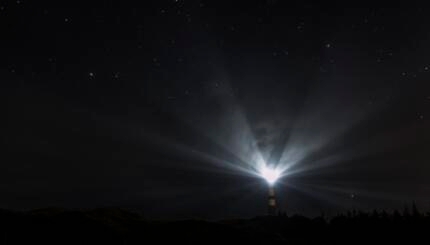“Can you hear me now?” In the famous TV advertisement about cellular phone service, it’s what the eyeglass-wearing geek clad in a blue uniform asks: “Can you hear me now?” This question is the same one we can ask ourselves and each other as we prepare for Passover – but with a very different bandwidth.
The voice of whatever we call sacred – God, holiness, community, tradition, the impulse to liberate from every narrowness – calls to us ever more through the meaning we associate with Passover. That voice asks, “Can you hear Me now?” – and let’s be real about this provocative question: Sometimes our honest answer is no. Sometimes life jams our circuits, sometimes there’s limited bandwidth, and sometimes we doubt that there’s anyone or anything with which to connect.
This perception (or lack of perception) begins the Passover story that Jews worldwide now prepare to re-tell and re-live. Enslaved Israelites didn’t hear God and didn’t even know from God: Generations of brutal bondage had beaten spirit, hope and hearing out of them, so understandably they couldn’t hear and didn’t believe. Maybe that’s why Torah not once but twice taught our ancestors to put holes in the ears of anyone wanting to remain in bondage, who refused to hear the call of freedom (Exodus 21:6, Deuteronomy 15:17).
But in Torah’s recount of the Passover liberation story, even if Israelite slaves couldn’t at first hear God, emphatically God could hear them. As the Slonimer Rebbe (1911-2000) taught, it was exactly this hearing – the people groaning and having courage to cry out under the freight of bondage, and God hearing their cry (Exodus 2:23-24) – that finally set liberation’s gears in motion. Freedom began with hearing.
Listening can be liberating. You might experience this truth if you ever listen to another so deeply that the very act of listening helps unshackle another’s spirit, or if the power of another’s deep hearing lifts you from the depths. As I write these words, I’m attending the 2016 Spiritual Directors International conference, and all that we do as spiritual directors (in Hebrew mashpi’im) starts with a radically hearing heart. Healing begins with hearing.
Listening can even make the future. My ALEPH co-chair Rachel Barenblat and I are taking an international Listening Tour about the next turning of ALEPH: Alliance for Jewish Renewal. From hundreds of people in communities coast to coast – from seminary leaders, teachers, clergy, congregants and colleagues of all stripes – we are hearing about yearning in Jewish life. We’re hearing where Jewish life hasn’t well served those yearnings. We’re hearing about contexts where Jewish life feels narrow or constrained. (We’re hearing really great stuff, too.) Merely listening doesn’t change externals – a conversation isn’t a budget, a roundtable isn’t policy – but true listening can powerfully help to change inner dynamics. The future begins with hearing.
*
Freedom, healing and the future – they all start with hearing. They start with the risk to attempt a connection even if we’re unsure it’ll hold, even if we’re unsure there’s anyone (or any One) to connect with. Our enslaved ancestors didn’t know, either, but the human impulse is to connect anyway.
The archetypal story of human liberation, the Passover story that defines and claims Jews as a people who went free from bondage to serve a greater power, teaches us this poignant lesson. Even if we don’t know if anything or anyone is listening, spiritually we still must attempt the call. We must ask, “Can you hear me now?” And in turn, the liberating power we call God asks us as we gather for Passover’s celebration of freedom renewed, “Can you hear Me now?”
“Can you hear Me now?” To the Four Questions at your seder table this Passover, let that be a Fifth Question that we ask ourselves and each other at our Passover celebration. Let our answers resonate with honesty, meaning and celebration for the connections evoked within, between and beyond. Dare to make the connection: Make the call.
seder
Pronounced: SAY-der, Origin: Hebrew, literally “order”; usually used to describe the ceremonial meal and telling of the Passover story on the first two nights of Passover. (In Israel, Jews have a seder only on the first night of Passover.)
Torah
Pronunced: TORE-uh, Origin: Hebrew, the Five Books of Moses.



